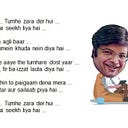
Some of you reached out to me in various ways seeking my point of view on application of Design Thinking during these unprecedented times of COVID-19. I finally found some time to pen down my personal thoughts on the potential application of Design Thinking at three levels (Individuals, Organizations & Governments).
This point of view will be shared in three parts, this is part one.
Introduction:
Let’s start by putting a context to Design Thinking, as I understand it …. A human obsessed approach to solving unprecedented and wicked challenges like COVID and others. Extremely effective in solving challenges that do not have historical references to learn from and the only way to learn is by experimentation.
While there have been various frames used to describe Design Thinking, I think the best way to understand it, is by understanding and imbibing its three key principles.
· Empathy above everything
· Experimentation is the only way
· The journey of evolution never ends
So now taking the context of COIVD-19, the present generation has never seen such a situation before, they have not been able to draw learning from any historical reference. Some of their foundational assumptions (we control the planet; we are a superior race etc.) of have been questioned.
This sets a perfect stage for the designers of the new world to use principles of Design Thinking and design a more evolved planet which gives equal importance and space for every creature inhabiting this planet.
Let’s first reflect on how can these principles help individuals and what changes they need to bring in their ways of living and designing.
Design Thinking for Individuals:
I think the first and most impactful application of these principles should happen at an INDIVIDUAL’s (people like you and me) level. Let me try to contextualize these principles for us as the citizens (designers) of the new world.
· Empathy above everything:

If we need to design a new world, then every individual needs to completely invert their focal point of empathy i.e. Empathy with fellow inhabitant — before empathy with fellow humans — before empathy with self. This will not only change our approach on how we design things but also change the way we live our lives.
· Experimentation is the only way:

During the past few days I have observed many people in my personal and professional space asking for advice / solutions on (what are you doing for this? what are you doing for that? etc.) various aspects connecting to life and business. When I ask them the BIG QUESTION “WHY?” I get an answer “So that we can replicate and safeguard ourselves”. While there is nothing wrong in asking and replicating, my only conflict with this approach is “I myself do not know whether what I am doing is right” as I am also continuously experimenting. Replication can be good strategy at times as it gives faster results, however it makes you depended for solutions on someone else. Further if done blindly it can sometime have exponential negative impact.
I think, when no one knows what the write answer is, it is better that we ourselves go on a journey of exploration to find the right answer. A good approach that individuals can adopt is the cycle of BUILD-FAIL-ITERATE-REPEAT and come out with something that works for them.
· The journey of evolution never ends:

The third principle is more applicable today than ever. People have realized that their old habits have hurt our planet a lot. It is high time for people to imbibe the practice of whatever they design must finally evolve into something that contributes back to the planet and its inhabitants. This means while designing, we need to continuously keep in mind the impact of our habits and designs on nature and try to bring it to closer to this cradle to cradle evolution philosophy.
My firm belief is that these three principles of inverted empathy, faster experimentation and cradle to cradle evolution will drive individuals to designing a better planet.
With hope, that the learning of this pandemic will make humans more empathetic and accommodative of other inhabitants of this planet, I end this first part of my article.
In the second part I will share my point of view on how organizations can apply the principles of Design Thinking in these unprecedented times.
